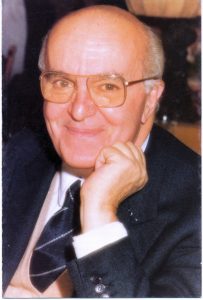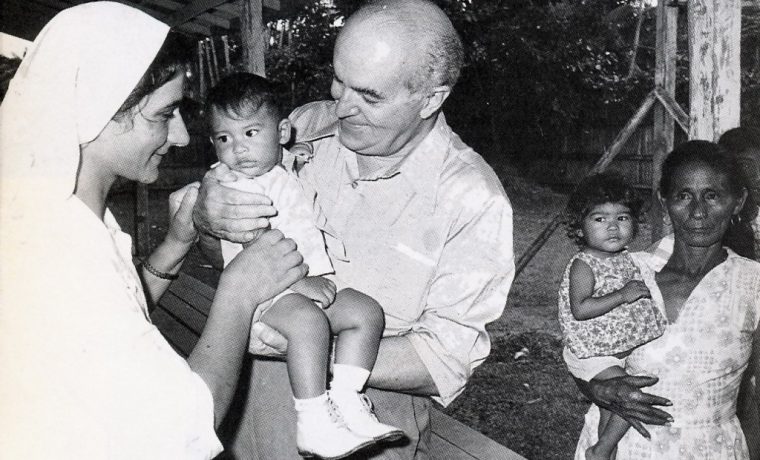 The year 2016 is the centenary of the birth of Marcello Candia who died in 1983 after giving all that he had, and the whole of his life, to service to the poor and the marginalised. As the years have gradually gone by, his reputation for holiness has increased, and the benefactors who believe in the activity of the Candia Foundation, which was established by Marcello Candia himself, continue to increase in number. The financial contributions which arrive in a miraculous way are always copious and allow the council of this foundation to increase the effectiveness of works which help the poor, the sick and the marginalised of Brazil. Don Mario Antonelli, a member of the council of the foundation and a missionary in Brazil for six years, has written for our readers an important memorial on our much beloved Venerable Marcello Candia.
The year 2016 is the centenary of the birth of Marcello Candia who died in 1983 after giving all that he had, and the whole of his life, to service to the poor and the marginalised. As the years have gradually gone by, his reputation for holiness has increased, and the benefactors who believe in the activity of the Candia Foundation, which was established by Marcello Candia himself, continue to increase in number. The financial contributions which arrive in a miraculous way are always copious and allow the council of this foundation to increase the effectiveness of works which help the poor, the sick and the marginalised of Brazil. Don Mario Antonelli, a member of the council of the foundation and a missionary in Brazil for six years, has written for our readers an important memorial on our much beloved Venerable Marcello Candia.
Marcello Candia: a light of holiness who illuminated a century of darkness with promises
He was born a short time after the ‘useless massacre’ of the Great War; he died a short time after the fall of a wall that should have proclaimed the appearance of bridges of peace.
In a scenario of civil injustice and national selfishness, Marcello was a just man. For him ‘justice’ meant being in one’s place: in history, in relationships with other people, and in one’s relationship with God. Hence his energetic dedication to studies; hence his generous nearness to the poor and his activity in missions.
A just man, indeed, is in the right place – at home with the affection of his family relatives, in the world with its diversities and poverties. During the years when he was building up his company, he tried to conjoin industrial development with the advance of his workers; and he sought justice in the drama of the disaster that practically eliminated his company. Lastly, he continued with his passion for justice and he allowed himself to be attracted by the cry of Amazonia, by the hopes of the oppressed and the thrown away. He bent down to his children and his poor people like a ‘Good Samaritan’, dressing the wounds of very many people who lay as though they were dead at the margins of society, as an open hand of God who sates the hunger of every living human being.
During a century that was so unjust, justice imbued the heart and the hands of Marcello. Men and peoples fought over power, lands and riches. Marcello learnt not to be concerned about his clothes and his food, or about his tomorrow: ‘Look first for the Kingdom of God and its righteousness, and all of these things will be placed in front of you’ (Matthew 6:33). Becoming familiar with the justice of God, he recognised that ‘all the things of life’ – food, clothes, time, the top places – had been placed in front of him; in trying to act like God would have done – and God possesses nothing but promotes everything – he welcomed and managed his possessions as though they were a gift destined not for selfish possession but for service to everyone. One person who testified in favour of his beatification observed that ‘for him his missionary vocation was a sense of justice. In basic terms he always said: “I have received a great deal; these people have received less, therefore I do this for the sake of justice. I am not doing anything special; I am doing something to which justice calls me”’.
It was ‘out of justice’ that Marcello felt that providing help was not enough; moved by the Holy Spirit, his heart led him to share the lives of the children and the poor of Amazonia. The whole of his professionalism was at the service of a charity that made itself presence; ‘being with them’, he listened with the motherly passion of God to groans and supplications, and with creative intelligence, ‘for them and with them’, he engaged in works of charity. In his solidarity there was not even the shadow of a vague and disengaged compassion or an almsgiving that covered up dramatic injustices. Indeed, his giving of possessions and resources expressed that self-giving which is the art of God. When a person is a master in the art of God, his holiness amazes and is catching – in life and in death.
But where did this art of his come from? From attending every day to the Christian life. In intimacy with Jesus, he felt the pain of the world, the wheezing of the poor and the sick, their sighing for a dignified life. From his mother, from Brother Cecilio, from the missionaries that he met, but above all else from the poor and lepers, he received the ABC of holiness; and he read it, day after day; and he sang it as a balsam for the sores of lepers. In his prayers, Marcello educated the ears of his heart to hear what was groaning in the slums of the earth and what was sung in heaven. Shortly before his death, he made the following personal observation: “when I arrived in Macapà I had a lot of financial resources because I had just sold my company and I wanted to use everything to create a hospital and other things. I was a religious man but with a lot of money and I relied a great deal on it and on my experience as an organiser. But when you are faced with enormous and deep suffering, with illnesses that deform the body, such as leprosy, when you are faced with desperate cases, well then you realise that if you, too, create a very rich and most perfect organisation to treat bodies you do not solve the problems of these people. There can be no doubt you have to use technical means, you have to create hospitals, dispensaries, leper colonies, efficient social centres; but all of this is nothing if there is not a true charity that comes from God and if there is not the giving of your own life to your brother. I understood, that is to say, that the absolute priority is spiritual”.
A friend and brother, we venerate him and we want to imitate him: still today, both amazed by him and subject to his contagious example.
Don Mario Antonelli
Member of the Council of the Candia Foundation















Camillians on Facebook
Camillians on Twitter
Camillians on Instagram